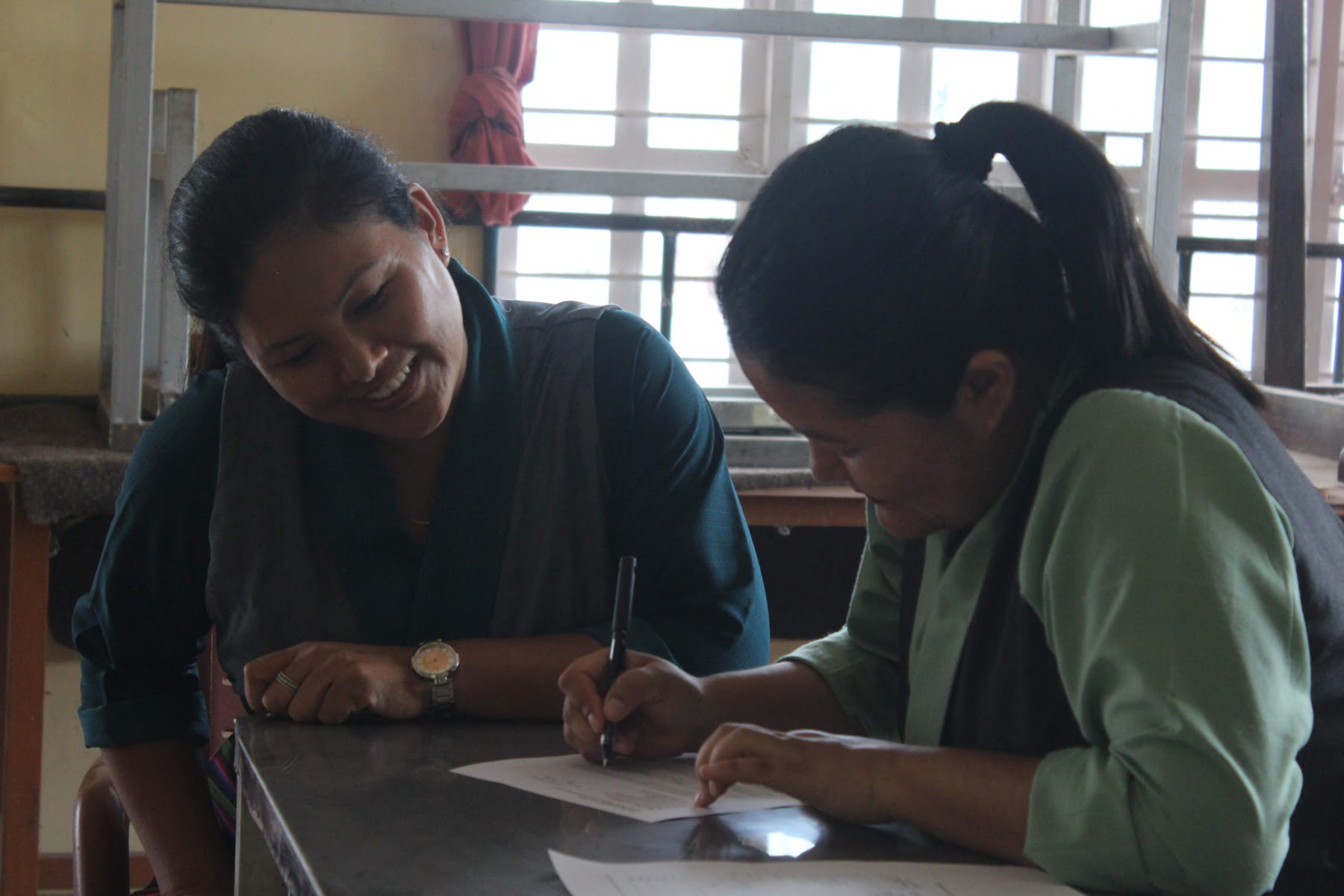Set in the mountainous terrains of Dharamshala, overlooking the mighty Himalayas, the Central Tibetan Administration or CTA is a unique governmental system in many ways. Globally, it is amongst a rare few hierarchically organised set-up for a government in exile. The CTA has proved itself to be dynamic and progressive as compared to traditional governments by taking the initiative to mainstream gender across their policies.
This is being done by the Women Empowerment Desk or WED. Amongst its myriad activities focused on women is a helpline serving victims of domestic and gender-based violence. The stand-out point of WED is its inherently strong women leadership. Ms Tsering Kyi is the wonder woman leading WED to the zenith of success, efficiency and impact-creation through her determination, focus, dedication and perseverance. The following is a conversation with Kyi la which inspired and moved me greatly.

Q. Please tell us a little about your childhood and background. How did the unique experience of being a Tibetan living in India shape your life and identity?
Tsering Kyi: I was born in Ladakh and did my schooling till 10th at Tibetan Children Village School in Ladakh. I was born to a middle class family; I am the eldest among four of our siblings. I am the first generation who went to school and got access to education. My grandparents had fled Tibet in 1959 and came to India in exile and my parents were born in early 1970’s in India. Growing up, I remember my mother often pushed me to do well in studies therefore, my parents played an important role in educating me and my siblings. In Ladakh, surrounded by Tibetan community and being in Tibetan school, I never felt like I was a refugee or exile in India.
What I do recall most is, in school, we were often reminded about the political status of being refugees and we had school events and patriotic songs dedicated to our Tibetan martyrs, paying homage to them. So, these events do shape my belief of my country Tibet which is somewhere else and that we have to preserve our own culture, tradition and language. But I never really realised the depth of being a refugee until I walked into Indian community after my high school on my own.
I don’t remember facing subtle form of discrimination based on my race, ethnicity and language until I joined my college. When I shared my story of being Tibetan in India, a lot of my classmates and Indian friends would curiously ask “Where is Tibet? Is it in India? Are you from the North East? Nepali? Chinese?”
I don’t remember facing subtle form of discrimination based on my race, ethnicity and language until I joined my college. When I shared my story of being Tibetan in India, a lot of my classmates and Indian friends would curiously ask “Where is Tibet? Is it in India? Are you from the North East? Nepali? Chinese?” So, these questions really planted a question within myself: how Tibet is less known to many and how Tibet’s struggle of freedom and invasion by the People’s Republic of China in 1959 is not known either. Therefore, these experiences helped me to be more aware about the Tibetan political status and how important my role as Tibetan plays in creating awareness and sharing knowledge about Tibet to my non-Tibetan friends.
Since then, I advocate for Tibetan issues whenever opportunity arises especially to those who don’t know what Tibet is or where it is and its relation with His Holiness the 14th Dalai Lama. Apart from these differences, I was born in India, Indian culture and food had strong influences on me as an individual especially in my choice of clothing, food, songs, and in lifestyle. Even though it was more difficult to be friends with Indians in college, I do have some of my best friends who are Indian and we do share the bond of friendship which is beyond our ethnicity, background, and political identity.

Q. What motivated you to join CTA?
Tsering Kyi: I was motivated to join CTA after the completion of my study in Women’s and Gender Studies from the USA in 2018. While I was studying my course, I realised that there are so many great things and opportunities that one can contribute to in the sector of gender and gender-related issues within the Tibetan community. I knew that the CTA has a Women’s Empowerment Desk that works towards empowering women and also towards achieving gender equality.
So, I found it a good fit for me to work under CTA and give back and contribute to my community within my knowledge and capacity and at the same time gain experience in this sector. On other hand, I chose CTA because of the accessibility and the platform that one receives to implement and learn is a unique experience. Since CTA is the Tibetan government in exile, I always wished to experience working under the government body.
Q. What do you love most about your work at CTA?
Tsering Kyi: Getting the opportunity to serve and contribute back to my own community is the greatest experience and gratitude that I feel being a part of CTA.
Q. Why was the Women Empowerment Desk created in CTA? What are the social issues that you address?
Tsering Kyi: Women’s Empowerment Desk was created to address the issue of Tibetan women inside and outside Tibet. It was founded in 2008 with the formulation of a policy called women empowerment policy. Since then, the WED has been associated with various social issues like; gender inequality, health care, gender-based violence, mental health, child abuse, bullying, menstrual health and hygiene, and sexual and reproductive right etc.

Q. What is it like being an inspiring woman leader in the Tibetan community and India at large? Who are the women who inspire you the most?
Tsering Kyi: The woman who had played an important role in my life and inspired me is my own mother. She has always prioritised us for our wellbeing and she has been able to nurture us and take care of us even after the difficulties that she has faced in her own life. So, I get inspiration from people who see beauty in the ordinary and who choose to stay real and true to themselves.
Also read: Watch: The Team Without A Nation – The Tibetan Women’s Football…
Q. What are some of the most moving stories that have touched your heart in your work in this role?
Tsering Kyi: Some of the moving stories or moments that really touched me in my work are people expressing their vulnerabilities and life stories with us and trusting us and our work. When we are able to change peoples’ perspectives, it moves me and really gives me hope to create a community free from violence and any form of discrimination.

Q. How has the pandemic affected the position of women within the community? What measures were taken by the WED to counteract these?
Tsering Kyi: I am sure the pandemic takes a toll on every one with unimaginable crises related to health, economy, education, politics and society. In terms of social crisis, violence against women is one of the prime factor that affects women differently. Globally, it is indicated that number of violence against women has increased in great amount during the pandemic and I think Tibetan community is not an exception to this. But we don’t have data at the moment to project the rise of violence against women in the Tibetan community but we do have Tibetan women helpline operated by the WED in partnership with the Tibetan Women’s Association (TWA).
Through the helpline we got to know about the prevalence of domestic violence in the Tibetan community and how it has been affected during the time of pandemic and lockdown. The Helpline team had helped the complainant according to their needs and intervention was made based on the need of the survivors.
Through the helpline we got to know about the prevalence of domestic violence in the Tibetan community and how it has been affected during the time of pandemic and lockdown. The Helpline team had helped the complainant according to their needs and intervention was made based on the need of the survivors. In parallel, WED had recently launched guidelines on prevention, prohibition, and redressal of Sexual and Gender Based Violence. This guideline applies to all Tibetan communities living in India with the aim to reduce Gender Based Violence in the Tibetan community.

Q. Moving forward, what is your hope with the WED and CTA? What goals would you most like to see accomplished for the development of the Tibetan community in India?
Tsering Kyi: In future, I would like to see more Tibetan people care about and prioritise gender issues and be more receptive and less in denial towards this issue. I think if there is a shift in perspective, change is possible and certainly it will happen in near future.
Q. What do you enjoy the most about living in Dharamshala?
Tsering Kyi: Being surrounded by Valley and Mountains. Fresh air is a privilege you get living in Dharamshala.

As I hear Tsering Kyi’s words dripping with humility over her achievements and pride for her homeland and community, I can’t help but feel the same longing for Tibetan freedom as the people of this community. I thank my lucky stars to have been placed with CTA after the rigorous and exceptionally selective process of becoming an AIF Clinton Fellow. I realise the unique position I am in to assist WED and Kyi la towards improving the lives of women in Tibetan communities across India. And it is this realisation strengthens my resolve to give it my all.
Also read: What Does It Mean To Be A Tibetan Outside Tibet?
References
- “About CTA.” tibet.net. https://tibet.net/about-cta. Accessed on November 10, 2020.
- “Women Empowerment.” https://tibet.net/tag/women-empowerment. Accessed on November 10, 2020.
- Saldon, Tenzin. “Women Empowerment Desk and TWA Releases Hotline for Sexual and Gender based Violence.” Central Tibetan Administration, 17 Apr. 2020, tibet.net/women-empowerment-desk-and-twa-releases-hotline-for-sexual-and-genderbased-violence.
- “Our Work.” sardfund.org. https://sardfund.org/our-work/gender-and-womens-empowerment. Accessed on November 11, 2020.
- “Tsering Kyi”. LinkedIn. https://in.linkedin.com/in/tsering-kyi-529551158. Accessed on November 12, 2020.
- Singh, Shivangi. “The Path Ahead: Serving As A Fellow This Winter.” American India Foundation, American India Foundation, 10 Nov. 2020, aif.org/the-path-ahead.
Note: All pictures used are courtesy of and used with permission from the Central Tibetan Administration (CTA).
Shivangi Singh is an AIF Clinton Fellow working with the Central Tibetan Administration for the year 2020 – 2021 and the Founder of Drishtikona – Changing Perspectives, a grassroots organization imparting Gender Education. She smashes the patriarchy, homophobia, transphobia, colorism, racism and lookism for a living. She is passionate about human and animal rights and hopes to make this world a more inclusive space for everyone.
This article was first published on American India Foundation and has been republished here with consent.




